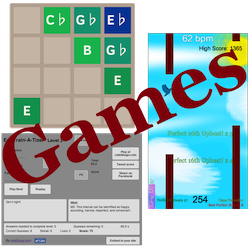A major problem that I am encountering as I am attempting to get into the music industry is that the more obscure composers are extremely difficult to discover. It’s so bad that it is nearly impossible to discover a new composer without having already heard the name outside of the internet. And when a composer’s website is found, there are no links going to more composers that the composer is associated with. In order for our ancient and ever developing craft to not be completely overrun by popular music, it has to be easier for consumers to find us.
Allow me to demonstrate the classical community’s deficiency in on-line promotion with an experiment I did that you all can conduct yourselves. Since I am also interested in rock bands, I decided to type “rock bands” into google. Instantly, a site came up that had all of the more popular rock bands listed by genre and country. I looked through the 64 genres, and quickly clicked on hard core since I am intensely interested in Underoath. I then clicked on a random band (Every Time I Die), liked it, and plan to check them out further once I have a significant source of income. I was connected with a new group of artists within minutes and didn’t need more than a basic knowledge of what I was looking for.
I then typed in “Classical composers” and quickly became frustrated with finding the type of classical music I was looking for. First of all, the classical music I enjoy the most is what is being written right now. The first link that I clicked on seemed more like a museum celebrating birthdays, dying days, historic musical events, and the occasional announcement of the performances of pieces that were written over 100 years ago. But I came to the site looking for new music to sample, buy, and listen to, not to become more educated about Prokofiev. I quickly revised my google search to “contemporary classical composers” knowing that it was the only way that I was going to find what I was looking for (keep in mind, the average music consumer would not know that the word contemporary is significant). Knowing that wikipedia didn’t have what I was looking for, I clicked the third link and found more dead people. I clicked the fourth link and had no idea how to go about looking through the site (did I mention that all of these sites are the most boring and flat looking things I have ever seen?). I clicked the next link and found a site for reviewing a few things I may have been looking for, but didn’t find any new music to sample or buy. No matter how many links I clicked, I either came to dead people, random samples of music I hated, or unattractive pages that were in complete disarray and ignorant of my generation’s needs for categorized music.
The same problem occurs in iTunes. When you type “contemporary classical” all that you encounter is a couple of popular classical-lite artists such as Josh Groban, followed almost immediately by pop singers accompanied by orchestras. If you only type “classical” your search results in dead composers. There are a few exceptions such as Yoshimatsu, who is under “classical,” but his name must be searched for and recognized amidst the dead that come up with him. The average consumer will not have the knowledge to click his name and will never experience the joy that I do when listening to the second movement of his saxophone concerto.
It is unacceptable that the first sites to come up in a search for modern or living composers are sites dedicated to the continuance of 250, 100, or even 25 year old work. Because of this, classical music has been driven underground so far that even interested people like myself can’t find new music in this important genre that they enjoy listening to without spending hours looking for it. Since our music is completely underground (at least to the perspective of this educated composer) and has been for some time, the music industry is continuing to evolve without us and drive us deeper into the ground. Our dead will not sustain the classical discipline for much longer and if we continue to only promote work that is far removed from our time, our way of creating new music will die. If we don’t do something soon then the only thing that will keep our educational programs (Collegiate and public) and our disciplined way of creating music going will be government programs that exist only to keep great art from extinction. Our way to creating music will be confined to a museum.
What is our solution then? Perhaps we need to keep music education programs going in our schools or be sure that community performances are being promoted in their areas. This was fine marketing for the 1950’s, but today people look for music on the internet and become confused when some other search pattern is suggested (including myself). Our solution lies on-line. It is to find our living composers, unite them, categorize them and their music making it easy for their audience for connect with them. This is the exact reason that popular music (in the broader sense) is evolving and classical music has become obscure. I propose an attractive on-line presence that has all living and educated composers and performers in one place categorized by genera, subgenera, location, instrumentation, etc. This would not take the place of on-line retailers or publishers, but rather make them more effective. It would be thousands of names and compositions that a consumer could click on and be directed to the best place for them to go sample that music and purchase it.
The goal: If a composer has 4,000 people who buy cd’s and scores every time they become available, then that composer will make a living of around $60,000 a year give or take. If this could take place on a massive worldwide level, there would be a lot more experienced composers writing music and appealing to more people and thousands of fantastic projects would be generated each year. Then the truly remarkable work would surface and become popular as the lesser composers (4,000 fans to one composer) would be doing their job and promoting the best of us by means of earned appreciation. This promotion of truly great work would happen due to the nature of google and its favor of sites with multiple links going to it. Each composer would have to support the work of their favorite living composers by reviewing their work and linking to their sites. This would not only promote great art effortlessly, but would also educate vast audiences. This is the ultimate goal that all composers should be seeking in their professions.
(If you’re curious, by my estimate America alone could have up to 75,000 people making livings with nothing but composition. And that’s assuming everyone only likes one composer and that these composers only write music without doing anything else.)

